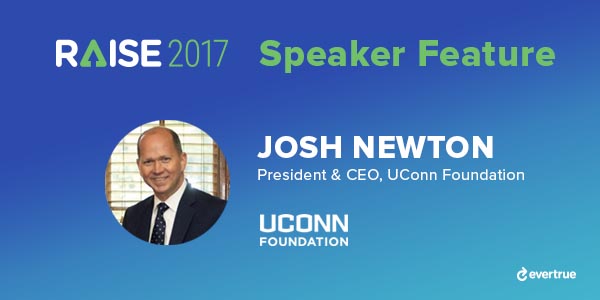
Breaking down silos has been a recurring theme in Josh Newton’s four-year tenure as president and CEO of the University of Connecticut (UConn) Foundation. Starting with folding the UConn Alumni Association into the Foundation in 2015, Josh has consistently embraced new modes of thinking to help him build a collaborative, donor-focused advancement office.
Then, in late 2016, Josh closed down UConn’s Office of Annual Giving.
Before Josh shares the complete story at EverTrue’s RAISE 2017 conference, we chatted with him to learn more about how and why he’s breaking up with the traditional annual giving model.
In your time as president of the UConn Foundation, what’s been your outlook on the state of advancement?
For a long time, I’ve been under the premise that the annual giving template within higher ed, or nonprofits in general, has run its course. The annual giving community probably doesn’t want to hear me say that, because I think they’re fairly entrenched in their model. They swear by it and even tell their bosses why we can’t stop calling people or why we have to mail people.
Yet we continue to see a decline in participation rates…. Over the last decade, national alumni giving percentages have fallen from 18 to 8 percent. At the same time there’s been a 34 percent increase in the number of alumni we’ve solicited, so it’s not making sense to any of us in leadership roles. And yet, people seem unwilling to tackle it or are unsure what to do about it.
How have you shaken up the engagement and fundraising model at UConn to address this challenge?
I knew the answer wasn’t to keep doing what we were doing… It was time to blow it up and start fresh. I knew that if I wasn’t willing to lend my weight to shifting the philosophy behind how we look at this problem as an institution, then things will never change. So, I began to shift our thinking towards a more multi-channel, personalized communication strategy for our alumni community.
And the end of last October, I intentionally shut down our Office of Annual Giving and molded it into what’s now known as our Office of Marketing & Communications. The office has a Design and Editorial team, a Stewardship team, and a newly created Engagement & Acquisition team. Essentially, I took the communications and annual giving teams… and condensed them into a singular team of Engagement and Acquisition. I’m not calling it annual giving because that’s not how our donors think.
I haven’t found many places that are willing to do this at such an extreme level in terms of charting a new path. We’ve been on the paved road for 40 years in terms of annual giving programs, and I just took a sharp right turn on the dirt road. I’m not sure when it’s going to be paved or what it’s going to look like, but that’s okay because it had to be done differently.
I knew that if I wasn’t willing to lend my weight to shifting the philosophy behind how we look at [annual giving] as an institution, then things will never change.
What would you say to a leader in a similar situation, or somebody who’s at the director level, who knows that this is the right direction to go and is trying to make a move like this? How do they get that buy-in?
There are two things I would say. If I were in a more junior role, I would probably take a phased approach to what I’m doing now. Maybe you could test it on a particular school or set of schools to move it to a more global platform.
You also want to be able to point to some results. I’m excited to, six months from now, show examples of how the model has completely shifted behaviors. I think a customized approach is going to have benefits not just on fundraising, but also on the engagement and stewardship side—on the donor’s feeling that we understand them. Again, I point to the for-profit world. How can OpenTable congratulate me on the five-year anniversary of my first reservation when we can’t do that for donors? We have more personal connectivity with our alumni than OpenTable does—yet, somehow, they’re communicating with them in a way we haven’t figured out.
How can OpenTable congratulate me on the five-year anniversary of my first reservation when we can’t do that for donors?
On a personal level, why dedicate your life to advancement?
That’s an easy one. I’m from a small town in North Carolina. My parents weren’t afforded the opportunity to go to college… my mother didn’t even finish high school. I was a scholarship kid who benefited from someone else’s generosity. And I decided long ago that I wanted to do something to pay it forward. Even in college, I was a phonathon student. I’m the rare breed who, at age 44, has never done anything other than work in philanthropy and development. I came from telefunds, to annual giving, to major gift work, to overseeing operations and then campaigns.
It’s my passion. When I come home having raised a scholarship for a kid, I feel like I’ve done something to pay it forward. It’s who I am and what I do and why I’m passionate about the work. It’s part of me to the core.